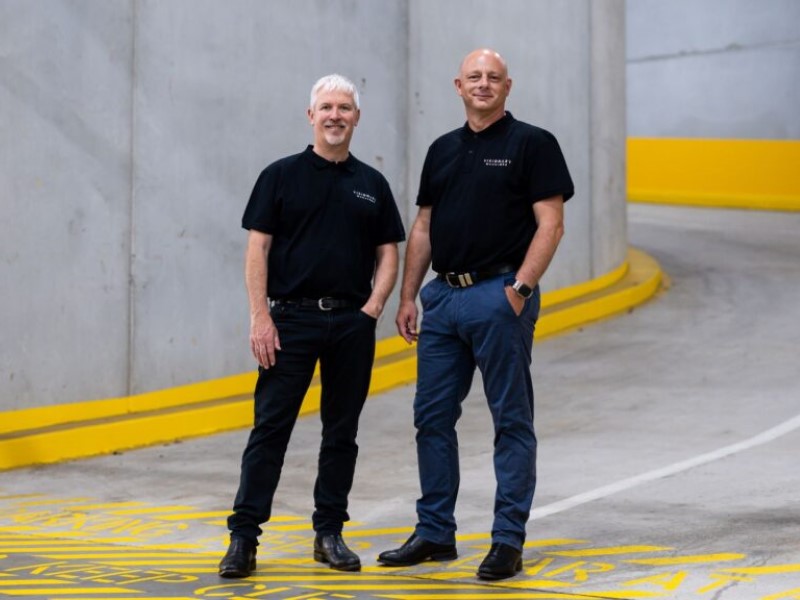Sydney-based computer vision startup Visionary Machines is eyeing global expansion, buoyed by “fantastic” support from the Department of Defence and its new approach to smaller tech suppliers.
After five years of research and development, the firm is entering its growth phase with two local pilot projects underway and a planned expansion into the United States, chief executive Sonny Foster told InnovationAus.com.
He adds the experience of working with the Department of Defence as a startup has been “fantastic. They’re extremely supportive.”

Alongside chief operating officer Nicholas Gibbs, the Visionary Machines executives said Defence’s philosophy shift to procuring innovative solutions over a short time span has led to a material change.
Visionary Machines completed demonstrations with the Australian Army in 2022 and is currently on the pathway to testing and evaluation of its camera-based drone detection technology through the Australian Strategic Capabilities Accelerator (ASCA)-supported Army Innovation Day.
Visionary Machines was founded in 2019 to pursue software development for 3D spatial sensing capabilities that are compatible with cameras across a range of spectrums, including visible light and thermal imaging.
The tech expertise underpinning the company’s products came from founders and machine learning experts Dr Rhys Newman and Dr Samson Lee, but it now has almost 20 staff.
Dr Newman and Dr Lee banded together following the shutdown of their former employer Canon Information Systems Research Australia (CiSRA), Canon’s computer vision research arm.
At its core, the technology processes several images to recreate a 3D model of where objects are located relative to the user as well as the object’s size and shape. This could be useful in supporting mining, agriculture, and vehicle and logistics autonomy.
“Whether its daytime or nighttime, all weather conditions, smoke and so on, our focus is in those core algorithms of processing…how to integrate those systems and get the most out of [commercially available cameras] rather than building cameras or systems,” Mr Gibbs said.
The civilian uses of Visionary Machines’ technology is in addition to the drone detection application currently being prepared for testing and evaluation with the Australian Army. The firm competed for this contract against 65 other applicants to the Army Innovation Day last year.
The contract was awarded in March, two months after Mr Foster and Mr Gibbs joined Visionary Machines from the Australian arm of multinational defence firm Collins Aerospace, acquired by Raytheon last year.
At the time of the move, Mr Foster was managing director of Collins Aerospace for Australia while Mr Gibbs was vice-president for Australian Programs. They were at the company, and its predecessor Rockwell Collins since 1998 and 2008 respectively.
“Nick and my background,” Mr Foster says, “has been over 50 years collectively working in defence industry. So we’re very familiar, very comfortable with how Defence works and I think we’re bringing that into the company”.
In the transition from leading the Australian arm of a defence multinational to a Sydney-based startup, Mr Foster said his experience with the Defence “has just been fantastic”.
Defence has shifted its procurement philosophy to get minimum viable capability to the defence force quicker, following the Defence Strategic Review last year. It also wants to increase support for sovereign capability delivered by local SMEs, under the Defence Industry Development Strategy. Mr Gibbs says the action has matched the vision.
“I think they’re actually moving at pace much quicker than they have been in the past,” he told InnovationAus.com
“Some might say it’s not quick enough, but I think there’s definitely, with things like ASCA, a real demonstrated intent,” Mr Gibbs said.
“Having experienced that recently versus defence industry over the last 10 or 20 years I think there is definitely a shift towards taking sovereign capabilities seriously and nurturing them…being aware that [Defence needs] a little bit of a different model to engage smaller companies rather than larger defence primes.”
In particular, contracting requirements for SMEs have been simplified and “tailored to better allow us to be successful”,” Mr Gibbs said. Its much needed acknowledgement that technology cycles are “not done in years now, it’s done in months”.
Mr Gibbs added that Defence’s new contracting arrangements are “being very pragmatic on outcomes”, and isn’t getting “bogged down with documentation, deliverables that are of low material value”.
“The focus is moving to more agility rather than saying ‘Hey, we’re going to buy this thing and we need to be able to support it for 20 or 30 years’. [Defence is] actually saying ‘we shouldn’t invest in that we should just plan on buying a better version in five years’ time and therefore there’s material you don’t need to worry about because we’re not going to need to fix it for such a long period’,” Mr Gibbs said.
The two Visionary Machines executives were also optimistic about the opportunities presented by incoming export-license free arrangements for defence industry and dual-use technologies with the United States.
“As a smaller organisation that does open up the opportunity with the US, and we see real applicability of what we’re doing in Australia right, particularly through these pilot projects we see opportunity in the US with various military organisations. We’re already exploring them,” Mr Foster said.
In 2021, Visionary Machines received investment from IQT, the Sydney arm of the CIA’s venture capital fund In-Q-Tel.
The company’s ultimate aim is “to get a solid foundation in Australia, I think that’s really important,” Mr Foster said.
“Get the success here, and we’re very much on that trajectory, and then expanding to the US in a controlled and deliberate way where we think we can really add value.”
Do you know more? Contact James Riley via Email.

